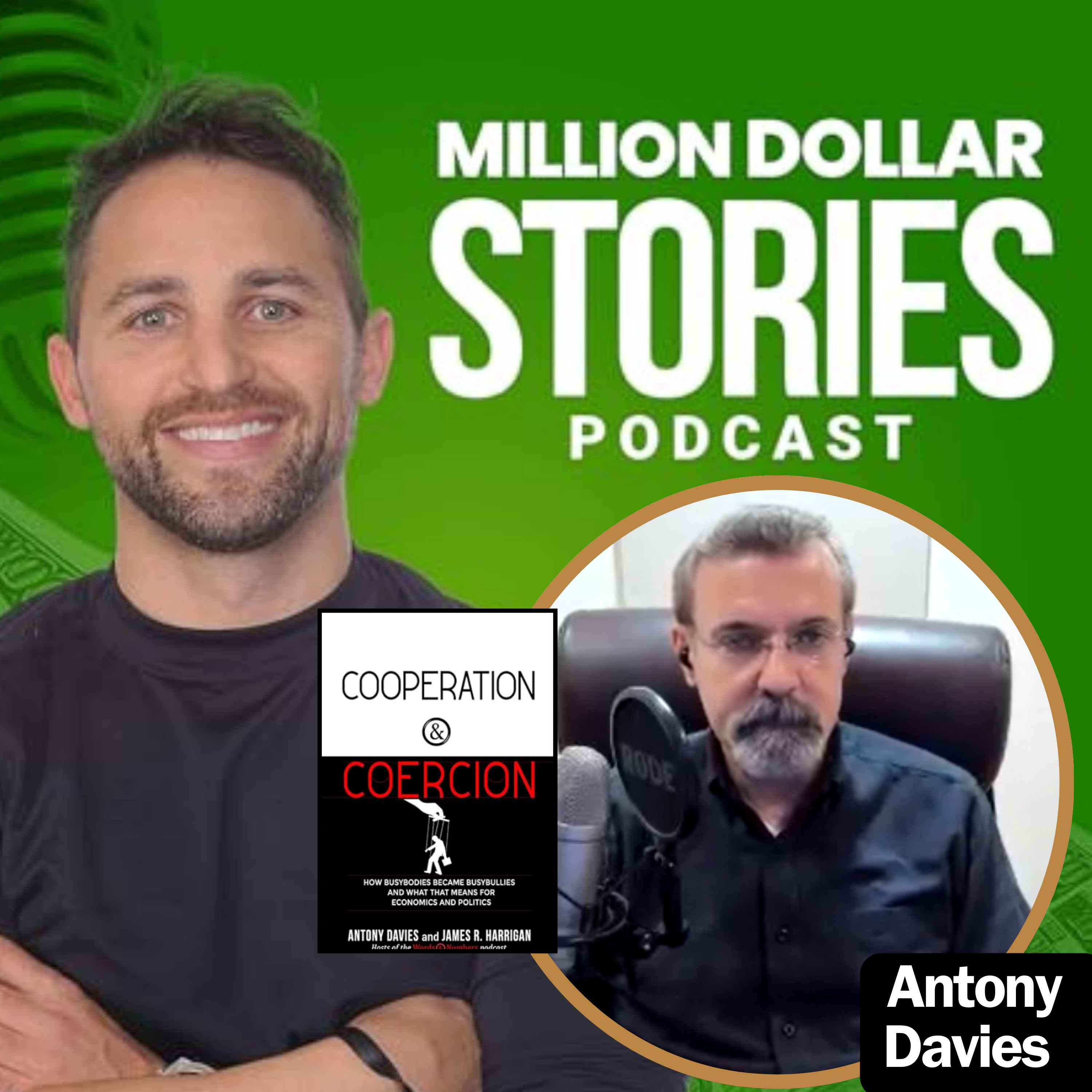Mike interviews Antony Davies.
Today, We are thrilled to share an enlightening conversation with Antony Davies, a distinguished economist and author of Cooperation and Coercion: How Busybodies Became Busybullies and What That Means for Economics and Politics. We embarked on a journey through the convoluted labyrinth of politics and economics, uncovering how well-intentioned busybodies transform into bus bullies and wreak havoc on our society. Buckle up because this is going to be a wild ride.
Our discussion started with an insightful reference to Socrates, who was deemed wise because he acknowledged what he didn’t know. Contrast that with today’s politicians who, regardless of their political alignment, proclaim they have all the solutions. Antony was quick to point out that they don’t. In reality, their so-called plans are often misguided at best and catastrophic at worst.
Antony shared his perspective on the good intentions of many who enter politics only to be corrupted by the system. It’s a classic tale of the road to hell being paved with good intentions. As they navigate the murky waters of political life, these individuals make compromises that slowly erode their integrity. Over time, they become unrecognizable, mere puppets controlled by unseen hands. Regulatory capture is the term Antony used to describe how decision-makers are co-opted by those they regulate.
Antony provided an intriguing example of the higher education sector. Universities have potent lobbyists influencing policies like student loan forgiveness and Pell Grant increases. When Congress or regulators need expert advice, they turn to these institutions, which advocate for policies that benefit themselves rather than the public. The result? Policies intended to alleviate student debt drive tuition costs through the roof, exacerbating the problem they aimed to solve.
Another striking example of busybodies turned bus bullies was the soda tax in Philadelphia. Politicians aiming to curb soda consumption among youth imposed a 30% tax on sugary drinks. While sales plummeted, actual consumption didn’t decrease. People simply bought their soda outside city limits, inadvertently creating food deserts within Philadelphia as grocery stores shut down. This policy, though well-meaning, had disastrous unintended consequences.
We delved into the psychology behind why people become bus bullies. Antony and I discussed how those without a clear mission in life often turn to imposing their beliefs on others. They seek to make an impact out of anger and a lack of purpose. In contrast, the happiest people are those with a mission—starting a business, getting in shape, or any other personal goal. These individuals are less likely to meddle in others’ lives because they are too busy improving their own.
Antony emphasized the importance of true equality—the idea that no one has the right to impose their will on another. This principle is often misunderstood. Instead of striving for equal outcomes, we should focus on equal opportunities. Personal responsibility is paramount. If everyone took control of their own lives, fewer bus bullies would try to dictate how others should live.
Looking ahead, Antony expressed cautious optimism about the economy. While many fear a recession or rampant inflation, he believes the economy is more vital than it appears. However, the looming threat of a $2 trillion annual deficit over the next decade is concerning. The government’s options are limited: drive up accurate interest rates by borrowing from markets or increase inflation by effectively borrowing from the Federal Reserve. Neither option is appealing, and we face a challenging economic future without a balanced budget.
We touched on the potential impact of BRICS (Brazil, Russia, India, China, and South Africa) on the global economy. While not an immediate concern, the rise of an alternative currency could undermine the US dollar’s dominance. If the world shifts away from the dollar, the US will feel the full brunt of its monetary policies, leading to higher inflation and economic instability.
Antony’s insights remind us of the importance of self-reliance and personal responsibility. In a world where bus bullies are all too familiar, we must strive to be mission-driven individuals who take control of our own destinies. Let’s focus on improving our lives rather than imposing our will on others.
Mike Fallat, aka The BookMan, is the owner of Dreamstarters Publishing and the Million Dollar Book Agency. They have helped 300+ entrepreneurs become bestselling authors. His goal is to help 1,000 entrepreneurs publish books and teach them how to use their books as a gateway to generating 7-figures.
Visit website for more information: https://www.milliondollarbookagency.com/
[{"id":2474,"link":"https:\/\/blog.milliondollarbookagency.com\/dana-caspersen-author-of-changing-the-conversation-the-17-principles-of-conflict-resolution\/","name":"dana-caspersen-author-of-changing-the-conversation-the-17-principles-of-conflict-resolution","thumbnail":{"url":"https:\/\/blog.milliondollarbookagency.com\/wp-content\/uploads\/2025\/01\/Dana-Caspersen.png","alt":""},"title":"Dana Caspersen - Author of \"Changing the Conversation: The 17 Principles of Conflict Resolution\"","author":{"name":"Bookman Forever","link":"https:\/\/blog.milliondollarbookagency.com\/author\/mdbapodcast\/"},"date":"Jan 20, 2025","dateGMT":"2025-01-20 11:00:00","modifiedDate":"2025-01-17 16:47:41","modifiedDateGMT":"2025-01-17 16:47:41","commentCount":"0","commentStatus":"open","categories":{"coma":"<a href=\"https:\/\/blog.milliondollarbookagency.com\/category\/podcasts\/\" rel=\"category tag\">Podcasts<\/a>","space":"<a href=\"https:\/\/blog.milliondollarbookagency.com\/category\/podcasts\/\" rel=\"category tag\">Podcasts<\/a>"},"taxonomies":{"post_tag":""},"readTime":{"min":4,"sec":48},"status":"publish","excerpt":""},{"id":2469,"link":"https:\/\/blog.milliondollarbookagency.com\/melissa-smith-author-of-hire-the-right-virtual-assistant-how-the-right-va-will-make-your-life-easier-create-time-and-make-you-more-money\/","name":"melissa-smith-author-of-hire-the-right-virtual-assistant-how-the-right-va-will-make-your-life-easier-create-time-and-make-you-more-money","thumbnail":{"url":"https:\/\/blog.milliondollarbookagency.com\/wp-content\/uploads\/2025\/01\/Melissa-Smith.png","alt":""},"title":"Melissa Smith - Author of \"Hire the Right Virtual Assistant: How the Right VA Will Make Your Life Easier, Create Time, and Make You More Money\"","author":{"name":"Bookman Forever","link":"https:\/\/blog.milliondollarbookagency.com\/author\/mdbapodcast\/"},"date":"Jan 17, 2025","dateGMT":"2025-01-17 16:08:32","modifiedDate":"2025-01-17 16:08:35","modifiedDateGMT":"2025-01-17 16:08:35","commentCount":"0","commentStatus":"open","categories":{"coma":"<a href=\"https:\/\/blog.milliondollarbookagency.com\/category\/podcasts\/\" rel=\"category tag\">Podcasts<\/a>","space":"<a href=\"https:\/\/blog.milliondollarbookagency.com\/category\/podcasts\/\" rel=\"category tag\">Podcasts<\/a>"},"taxonomies":{"post_tag":""},"readTime":{"min":5,"sec":19},"status":"publish","excerpt":""},{"id":2459,"link":"https:\/\/blog.milliondollarbookagency.com\/beverly-kaye-author-of-love-em-or-lose-em-sixth-edition-getting-good-people-to-stay\/","name":"beverly-kaye-author-of-love-em-or-lose-em-sixth-edition-getting-good-people-to-stay","thumbnail":{"url":"https:\/\/blog.milliondollarbookagency.com\/wp-content\/uploads\/2025\/01\/Beverly-Kaye.png","alt":""},"title":"Beverly Kaye - Author of \"Love \u2019Em or Lose \u2019Em, Sixth Edition: Getting Good People to Stay\"","author":{"name":"Bookman Forever","link":"https:\/\/blog.milliondollarbookagency.com\/author\/mdbapodcast\/"},"date":"Jan 10, 2025","dateGMT":"2025-01-10 11:20:00","modifiedDate":"2025-01-09 15:28:32","modifiedDateGMT":"2025-01-09 15:28:32","commentCount":"0","commentStatus":"open","categories":{"coma":"<a href=\"https:\/\/blog.milliondollarbookagency.com\/category\/podcasts\/\" rel=\"category tag\">Podcasts<\/a>","space":"<a href=\"https:\/\/blog.milliondollarbookagency.com\/category\/podcasts\/\" rel=\"category tag\">Podcasts<\/a>"},"taxonomies":{"post_tag":""},"readTime":{"min":5,"sec":7},"status":"publish","excerpt":""},{"id":2454,"link":"https:\/\/blog.milliondollarbookagency.com\/stephen-skelton-author-of-viticulture-2nd-edition-an-introduction-to-commercial-grape-growing-for-wine-production\/","name":"stephen-skelton-author-of-viticulture-2nd-edition-an-introduction-to-commercial-grape-growing-for-wine-production","thumbnail":{"url":"https:\/\/blog.milliondollarbookagency.com\/wp-content\/uploads\/2025\/01\/Stephen-Skelton.png","alt":""},"title":"Stephen Skelton - Author of \"Viticulture - 2nd Edition: An Introduction to Commercial Grape Growing for Wine Production\"","author":{"name":"Bookman Forever","link":"https:\/\/blog.milliondollarbookagency.com\/author\/mdbapodcast\/"},"date":"Jan 9, 2025","dateGMT":"2025-01-09 15:11:29","modifiedDate":"2025-01-09 15:11:33","modifiedDateGMT":"2025-01-09 15:11:33","commentCount":"0","commentStatus":"open","categories":{"coma":"<a href=\"https:\/\/blog.milliondollarbookagency.com\/category\/podcasts\/\" rel=\"category tag\">Podcasts<\/a>","space":"<a href=\"https:\/\/blog.milliondollarbookagency.com\/category\/podcasts\/\" rel=\"category tag\">Podcasts<\/a>"},"taxonomies":{"post_tag":""},"readTime":{"min":5,"sec":20},"status":"publish","excerpt":""},{"id":2448,"link":"https:\/\/blog.milliondollarbookagency.com\/david-brier-author-of-rich-brand-poor-brand-how-to-unleash-your-david-in-a-world-of-goliaths\/","name":"david-brier-author-of-rich-brand-poor-brand-how-to-unleash-your-david-in-a-world-of-goliaths","thumbnail":{"url":"https:\/\/blog.milliondollarbookagency.com\/wp-content\/uploads\/2025\/01\/David-Brier.png","alt":""},"title":"David Brier - Author of \"Rich Brand Poor Brand: How to Unleash Your David in a World of Goliaths\"","author":{"name":"Bookman Forever","link":"https:\/\/blog.milliondollarbookagency.com\/author\/mdbapodcast\/"},"date":"Jan 6, 2025","dateGMT":"2025-01-06 16:03:34","modifiedDate":"2025-01-06 16:03:37","modifiedDateGMT":"2025-01-06 16:03:37","commentCount":"0","commentStatus":"open","categories":{"coma":"<a href=\"https:\/\/blog.milliondollarbookagency.com\/category\/podcasts\/\" rel=\"category tag\">Podcasts<\/a>","space":"<a href=\"https:\/\/blog.milliondollarbookagency.com\/category\/podcasts\/\" rel=\"category tag\">Podcasts<\/a>"},"taxonomies":{"post_tag":""},"readTime":{"min":4,"sec":22},"status":"publish","excerpt":""},{"id":2438,"link":"https:\/\/blog.milliondollarbookagency.com\/stephanie-seneff-author-of-toxic-legacy-how-the-weedkiller-glyphosate-is-destroying-our-health-and-the-environment\/","name":"stephanie-seneff-author-of-toxic-legacy-how-the-weedkiller-glyphosate-is-destroying-our-health-and-the-environment","thumbnail":{"url":"https:\/\/blog.milliondollarbookagency.com\/wp-content\/uploads\/2024\/12\/Stephanie-Seneff.png","alt":""},"title":"Stephanie Seneff - Author of \"Toxic Legacy: How the Weedkiller Glyphosate Is Destroying Our Health and the Environment\"","author":{"name":"Bookman Forever","link":"https:\/\/blog.milliondollarbookagency.com\/author\/mdbapodcast\/"},"date":"Dec 31, 2024","dateGMT":"2024-12-31 15:18:24","modifiedDate":"2024-12-31 15:18:28","modifiedDateGMT":"2024-12-31 15:18:28","commentCount":"0","commentStatus":"open","categories":{"coma":"<a href=\"https:\/\/blog.milliondollarbookagency.com\/category\/podcasts\/\" rel=\"category tag\">Podcasts<\/a>","space":"<a href=\"https:\/\/blog.milliondollarbookagency.com\/category\/podcasts\/\" rel=\"category tag\">Podcasts<\/a>"},"taxonomies":{"post_tag":""},"readTime":{"min":4,"sec":41},"status":"publish","excerpt":""},{"id":2420,"link":"https:\/\/blog.milliondollarbookagency.com\/steve-selengut-author-of-retirement-money-secrets-a-financial-insiders-guide-to-income-independence\/","name":"steve-selengut-author-of-retirement-money-secrets-a-financial-insiders-guide-to-income-independence","thumbnail":{"url":"https:\/\/blog.milliondollarbookagency.com\/wp-content\/uploads\/2024\/12\/Steve-Selengut.png","alt":""},"title":"Steve Selengut - Author of \"Retirement Money Secrets: A Financial Insider's Guide to Income Independence\"","author":{"name":"Bookman Forever","link":"https:\/\/blog.milliondollarbookagency.com\/author\/mdbapodcast\/"},"date":"Dec 23, 2024","dateGMT":"2024-12-23 11:00:00","modifiedDate":"2024-12-21 16:20:18","modifiedDateGMT":"2024-12-21 16:20:18","commentCount":"0","commentStatus":"open","categories":{"coma":"<a href=\"https:\/\/blog.milliondollarbookagency.com\/category\/podcasts\/\" rel=\"category tag\">Podcasts<\/a>","space":"<a href=\"https:\/\/blog.milliondollarbookagency.com\/category\/podcasts\/\" rel=\"category tag\">Podcasts<\/a>"},"taxonomies":{"post_tag":""},"readTime":{"min":5,"sec":7},"status":"publish","excerpt":""},{"id":2393,"link":"https:\/\/blog.milliondollarbookagency.com\/dr-steven-yacovelli-author-of-your-queer-career-workplace-advice-from-the-gay-leadership-dude\/","name":"dr-steven-yacovelli-author-of-your-queer-career-workplace-advice-from-the-gay-leadership-dude","thumbnail":{"url":"https:\/\/blog.milliondollarbookagency.com\/wp-content\/uploads\/2024\/12\/steve-yacovelli.png","alt":""},"title":"Dr. Steven Yacovelli - Author of \"Your Queer Career: Workplace Advice from \"The Gay Leadership Dude.\"","author":{"name":"Bookman Forever","link":"https:\/\/blog.milliondollarbookagency.com\/author\/mdbapodcast\/"},"date":"Dec 16, 2024","dateGMT":"2024-12-16 11:53:00","modifiedDate":"2024-12-13 17:53:56","modifiedDateGMT":"2024-12-13 17:53:56","commentCount":"0","commentStatus":"open","categories":{"coma":"<a href=\"https:\/\/blog.milliondollarbookagency.com\/category\/podcasts\/\" rel=\"category tag\">Podcasts<\/a>","space":"<a href=\"https:\/\/blog.milliondollarbookagency.com\/category\/podcasts\/\" rel=\"category tag\">Podcasts<\/a>"},"taxonomies":{"post_tag":""},"readTime":{"min":4,"sec":49},"status":"publish","excerpt":""},{"id":2385,"link":"https:\/\/blog.milliondollarbookagency.com\/janelle-brittain-author-of-how-to-say-it-performance-reviews-phrases-and-strategies-for-painless-and-productive-performance-reviews\/","name":"janelle-brittain-author-of-how-to-say-it-performance-reviews-phrases-and-strategies-for-painless-and-productive-performance-reviews","thumbnail":{"url":"https:\/\/blog.milliondollarbookagency.com\/wp-content\/uploads\/2024\/12\/Janelle-Brittai.png","alt":""},"title":"Janelle Brittain - Author of \"How To Say It Performance Reviews: Phrases and Strategies for Painless and Productive Performance Reviews\"","author":{"name":"Bookman Forever","link":"https:\/\/blog.milliondollarbookagency.com\/author\/mdbapodcast\/"},"date":"Dec 13, 2024","dateGMT":"2024-12-13 17:42:59","modifiedDate":"2024-12-13 17:43:03","modifiedDateGMT":"2024-12-13 17:43:03","commentCount":"0","commentStatus":"open","categories":{"coma":"<a href=\"https:\/\/blog.milliondollarbookagency.com\/category\/podcasts\/\" rel=\"category tag\">Podcasts<\/a>","space":"<a href=\"https:\/\/blog.milliondollarbookagency.com\/category\/podcasts\/\" rel=\"category tag\">Podcasts<\/a>"},"taxonomies":{"post_tag":""},"readTime":{"min":5,"sec":0},"status":"publish","excerpt":""},{"id":2369,"link":"https:\/\/blog.milliondollarbookagency.com\/paul-falcone-author-of-101-tough-conversations-to-have-with-employees-a-managers-guide-to-addressing-performance-conduct-and-discipline-challenges\/","name":"paul-falcone-author-of-101-tough-conversations-to-have-with-employees-a-managers-guide-to-addressing-performance-conduct-and-discipline-challenges","thumbnail":{"url":"https:\/\/blog.milliondollarbookagency.com\/wp-content\/uploads\/2024\/12\/Paul-Falcone.png","alt":""},"title":"Paul Falcone - Author of \"101 Tough Conversations to Have with Employees: A Manager's Guide to Addressing Performance, Conduct, and Discipline Challenges\"","author":{"name":"Bookman Forever","link":"https:\/\/blog.milliondollarbookagency.com\/author\/mdbapodcast\/"},"date":"Dec 10, 2024","dateGMT":"2024-12-10 15:09:01","modifiedDate":"2024-12-10 15:09:05","modifiedDateGMT":"2024-12-10 15:09:05","commentCount":"0","commentStatus":"open","categories":{"coma":"<a href=\"https:\/\/blog.milliondollarbookagency.com\/category\/podcasts\/\" rel=\"category tag\">Podcasts<\/a>","space":"<a href=\"https:\/\/blog.milliondollarbookagency.com\/category\/podcasts\/\" rel=\"category tag\">Podcasts<\/a>"},"taxonomies":{"post_tag":""},"readTime":{"min":5,"sec":11},"status":"publish","excerpt":""},{"id":2362,"link":"https:\/\/blog.milliondollarbookagency.com\/julie-winkle-giulioni-co-author-of-help-them-grow-or-watch-them-go-career-conversations-organizations-need-and-employees-still-want\/","name":"julie-winkle-giulioni-co-author-of-help-them-grow-or-watch-them-go-career-conversations-organizations-need-and-employees-still-want","thumbnail":{"url":"https:\/\/blog.milliondollarbookagency.com\/wp-content\/uploads\/2024\/12\/Julie-Winkle.png","alt":""},"title":"Julie Winkle Giulioni - Co-Author of \"Help Them Grow or Watch Them Go: Career Conversations Organizations Need and Employees Still Want\"","author":{"name":"Bookman Forever","link":"https:\/\/blog.milliondollarbookagency.com\/author\/mdbapodcast\/"},"date":"Dec 5, 2024","dateGMT":"2024-12-05 17:12:14","modifiedDate":"2024-12-05 17:12:18","modifiedDateGMT":"2024-12-05 17:12:18","commentCount":"0","commentStatus":"open","categories":{"coma":"<a href=\"https:\/\/blog.milliondollarbookagency.com\/category\/podcasts\/\" rel=\"category tag\">Podcasts<\/a>","space":"<a href=\"https:\/\/blog.milliondollarbookagency.com\/category\/podcasts\/\" rel=\"category tag\">Podcasts<\/a>"},"taxonomies":{"post_tag":""},"readTime":{"min":4,"sec":48},"status":"publish","excerpt":""},{"id":2346,"link":"https:\/\/blog.milliondollarbookagency.com\/jessica-pettitt-author-of-almost-doing-good-doing-the-best-that-you-can-with-what-you-have-some-of-the-time\/","name":"jessica-pettitt-author-of-almost-doing-good-doing-the-best-that-you-can-with-what-you-have-some-of-the-time","thumbnail":{"url":"https:\/\/blog.milliondollarbookagency.com\/wp-content\/uploads\/2024\/11\/Jessica-Pettitt.png","alt":""},"title":"Jessica Pettitt - Author of \"Almost Doing Good: Doing the Best That You Can With What You Have Some of the Time\"","author":{"name":"Bookman Forever","link":"https:\/\/blog.milliondollarbookagency.com\/author\/mdbapodcast\/"},"date":"Dec 2, 2024","dateGMT":"2024-12-02 11:04:00","modifiedDate":"2024-11-30 19:11:42","modifiedDateGMT":"2024-11-30 19:11:42","commentCount":"0","commentStatus":"open","categories":{"coma":"<a href=\"https:\/\/blog.milliondollarbookagency.com\/category\/podcasts\/\" rel=\"category tag\">Podcasts<\/a>","space":"<a href=\"https:\/\/blog.milliondollarbookagency.com\/category\/podcasts\/\" rel=\"category tag\">Podcasts<\/a>"},"taxonomies":{"post_tag":""},"readTime":{"min":4,"sec":51},"status":"publish","excerpt":""}]


